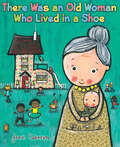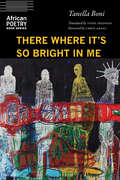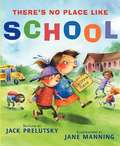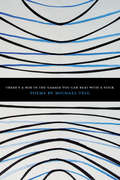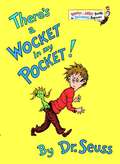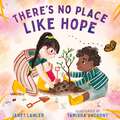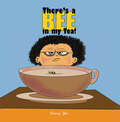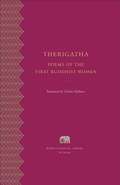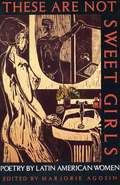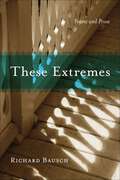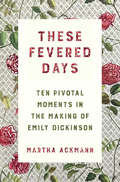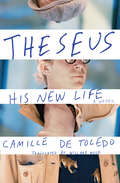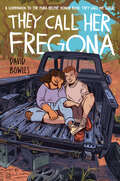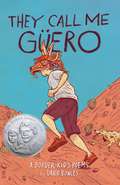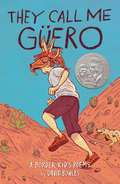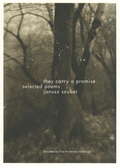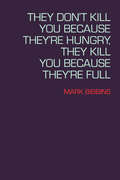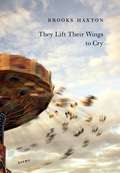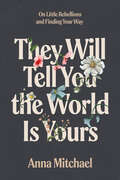- Table View
- List View
There Was an Old Woman Who Lived in a Shoe (Jane Cabrera's Story Time)
by Jane CabreraFall in love with this bright, ecofriendly take on a favorite rhyme for children. &“There was an old woman who lived in a shoe, and some days were just a big Hullabaloo!&” Readers follow along as a woman and her household of high-spirited children and their pets reuse and recycle everyday items. The crew repair their broken furniture, find alternative modes of transportation when the car breaks down, and remake worn clothing with colorful patches. Jane Cabrera&’s charming acrylic artwork is perfect for sharing with young readers and listeners.
There Where It's So Bright in Me (African Poetry Book)
by Tanella BoniThere Where It&’s So Bright in Me pries at the complexities of difference—race, religion, gender, nationality—that shape twenty-first-century geopolitical conditions. With work spanning more than thirty-five years and as one of the most prominent figures in contemporary African literature, Tanella Boni is uniquely positioned to test the distinctions of self, other, and belonging. Two twenty-first-century civil wars have made her West African home country of Côte d&’Ivoire unstable. Abroad in the United States, Boni confronts the racialized violence that accompanies the idea of Blackness; in France, a second home since her university days, Boni encounters the nationalism roiling much of Europe as the consequences of (neo)colonialism shift the continent&’s ethnic and racial profile. What would it mean for the borders that segregate—for these social, political, cultural, personal, and historicizing forces that enshroud us—to lose their dominion? In a body under constant threat, how does the human spirit stay afloat? Boni&’s poetry is characterized by a hard-earned buoyancy, given her subject matter. Her empathy, insight, and plainspoken address are crucial contributions to the many difficult contemporary conversations we must engage.
There's No Place Like School: Classroom Poems
by Jack PrelutskyAges 5-10 A day at school is: a. marvelous b. dreadful c. silly d. all of the above--and much, much more! From suspicious hot lunches (yuck!), to pop quizzes (oh, no!) to recess and best friends (hooray!), everything you love--and love to hate--about school is front and center in this collection of eighteen poems by thirteen celebrated poets. One thing's for certain: there's no place like school!
There's a Box in the Garage You Can Beat With a Stick
by Michael TeigMichael Teig's long-awaited second collection is the perfect poetry companion: witty, intriguing, and self-effacing as it picks up overheard conversations and the accidental encounters of everyday life. As Stephen Dobyns wrote, Teig's poems "have this ability to make the world fresh again and make us realize once again why we love the world, despite its failings and our own."
There's a Box in the Garage You Can Beat With a Stick (American Poets Continuum)
by Michael TeigMichael Teig’s long-awaited second collection is the perfect poetry companion: witty, intriguing, and self-effacing as it picks up overheard conversations and the accidental encounters of everyday life. As Stephen Dobyns wrote, Teig's poems "have this ability to make the world fresh again and make us realize once again why we love the world, despite its failings and our own."
There's a Wocket in My Pocket
by Dr SeussBright and Early Books "... revolutionize the approach to reading for young readers. These delightful books . . . stir the imagination and create a taste for more and more reading materials." - Dr. Margaret B. Parke, Professor. Brooklyn College. The Cat in the Hat proudly presents books for the youngest of the young! The stories are brief and funny, the words are few and easy and have a happy, catchy rhythm, and the pictures are clear and colorful clues to the text.
There’s No Place Like Hope
by Janet LawlerThere’s no place like hope, where possible lives, where people are helpful and everyone gives.If you’re feeling scared or sad, happy or helpful—hope will guide you. It’s not always easy. And sometimes having hope means being brave, or determined, or kind. At the end of the day, hope is where better will be.This sweet, rhythmic picture book is a gentle yet powerful exploration of how hope makes us loving, courageous, and connected to one another.
There’s a Bee in my Tea!
by Garry YeeHow do you like to drink your tea? With sugar? With milk? With ice? There are many ways to drink your tea, but I&’ll bet none of them include having a bee with your tea! This is the story of an enterprising but very annoying bee who seems to think it&’s totally okay to do the backstroke in someone&’s cup of tea!So, what would you do if you found a bee swimming in your tea? Would you get grumpy and climb up a tree? Would you call the bee catcher angrily, or would you exercise creativity… and look and think and wait and see?Find out how one very forgiving tea drinker deals with this problem in the mad-cap, rhyming adventure, There&’s a Bee in my Tea!
Therigatha: Poems Of The First Buddhist Women
by Charles HalliseyThe Therigatha, composed more than two millennia ago, is an anthology of poems in the Pali language by and about the first Buddhist women. These women weretheris, the senior ones, among ordained Buddhist women, and they bore that epithet because of their religious achievements. The poems they left behind are arguably among the most ancient examples of women's writing in the world and they are unmatched for their quality of personal expression and the extraordinary insight they offer into the lives of women in the ancient Indian past—and indeed, into the lives of women as such. <p><p> This new version of the Therigatha, based on a careful reassessment of the major editions of the work and printed in the Roman script common for modern editions of Pali texts, offers the most powerful and the most readable translation ever achieved in English. <p> The Murty Classical Library of India makes available original texts and modern English translations of the masterpieces of literature and thought from across the whole spectrum of Indic languages over the past two millennia in the most authoritative and accessible formats on offer anywhere.
These Are Not Sweet Girls: Poetry By Latin American Women (Secret Weavers #7)
by Isabel Allende Marjorie AgosínThis reprint of a White Pine Press classic brings together an astonishing range of work from the turn of the century to the present. Despite cultural maxims encouraging them to be silent, women continue to speak, often through the language of poetry, where there is an abundance of intuition and the possibility of reclaiming power through language. In the work included here, we see how the common threads of courage and inventiveness can be woven into a bright tapestry of women’s voices that presents a true picture of a culture that must create its own history. Over fifty poets, including those well-known, such as Gabriela Mistral, Alfonsina Storni, and Cristina Peri Rossi, and those just emerging are included. Marjorie Agos n, editor of the Secret Weavers series, is well-known as a poet, writer, and human rights activist. She is a professor at Wellesley College in Massachusetts.
These Are the Hands: A Tale of Water Restoration (Fountas & Pinnell Classroom, Guided Reading Grade 5)
by Elizabeth RuschNIMAC-sourced textbook
These Extremes: Poems and Prose (Southern Messenger Poets)
by Richard BauschIn his first collection of poetry and prose, award-winning fiction writer Richard Bausch proves that he is also an accomplished poet. Penned over a span of many years, the poems in These Extremes deal with a wide variety of subjects. Many focus on Bausch’s own family and relationships. In one long, touching poem, “Barbara (1943–1974),” the poet memorializes his oldest sister, who died young. He also offers two prose memory pieces, recollections from his childhood and adolescence. In these brief “essays,” Bausch draws loving but unsentimental portraits of his father, mother, and other relatives as he reflects on the sense of belonging that he gained from his family—something he hopes to pass on to his own children in this violent, chaotic world. In “Back Stories,” the center of the book, Bausch effortlessly weaves poems around familiar characters from history, literature, movies, and popular culture—including Thomas Jefferson, Shakespeare’s Falstaff, Nurse Ratched from One Flew Over the Cuckoo’s Nest, and Sam, the piano player from Casablanca. Decidedly accessible in form, theme, and expression, These Extremes will surprise and delight lovers of poetry and fans of Bausch’s stories and novels.
These Fevered Days: Ten Pivotal Moments In The Making Of Emily Dickinson
by Martha AckmannAn engaging, intimate portrait of Emily Dickinson, one of America’s greatest and most-mythologized poets, that sheds new light on her groundbreaking poetry. On August 3, 1845, young Emily Dickinson declared, “All things are ready” and with this resolute statement, her life as a poet began. Despite spending her days almost entirely “at home” (the occupation listed on her death certificate), Dickinson’s interior world was extraordinary. She loved passionately, was hesitant about publication, embraced seclusion, and created 1,789 poems that she tucked into a dresser drawer. In These Fevered Days, Martha Ackmann unravels the mysteries of Dickinson’s life through ten decisive episodes that distill her evolution as a poet. Ackmann follows Dickinson through her religious crisis while a student at Mount Holyoke, which prefigured her lifelong ambivalence toward organized religion and her deep, private spirituality. We see the poet through her exhilarating frenzy of composition, through which we come to understand her fiercely self-critical eye and her relationship with sister-in-law and first reader, Susan Dickinson. Contrary to her reputation as a recluse, Dickinson makes the startling decision to ask a famous editor for advice, writes anguished letters to an unidentified “Master,” and keeps up a lifelong friendship with writer Helen Hunt Jackson. At the peak of her literary productivity, she is seized with despair in confronting possible blindness. Utilizing thousands of archival letters and poems as well as never-before-seen photos, These Fevered Days constructs a remarkable map of Emily Dickinson’s inner life. Together, these ten days provide new insights into her wildly original poetry and render a concise and vivid portrait of American literature’s most enigmatic figure.
Theseus, His New Life: A Novel
by Camille de ToledoA mesmerizing, poetic autofiction about the quest to find meaning in family tragedies, and a sense of self after loss. In 2012, Theseus heads east in search of a new life, fleeing the painful memories of his past: the suicide of his older brother, the death of his mother, shortly followed by the death of his father. He takes three boxes of archives, leaving everything in disarray, and boards the last night train with his children. He thinks he&’s heading toward the light, toward a reinvention, but the past quickly catches up to him. With a stunning mix of poetry and prose, Camille de Toledo beautifully captures the conflicting urges to look back at or away from our complex histories, made all the more poignant through the scattered contents of Theseus&’s archives—black-and-white photos, fragments of handwritten notes.
They Call Her Fregona: A Border Kid's Poems
by David BowlesA companion to the Pura Belpré Honor book They Call Me Güero. <P><P> “You can be my boyfriend.” It only takes five words to change Güero’s life at the end of seventh grade. The summer becomes extra busy as he learns to balance new band practice with his old crew, Los Bobbys, and being Joanna Padilla’s boyfriend. They call her “fregona” because she’s tough, always sticking up for her family and keeping the school bully in check. But Güero sees her softness. Together they cook dollar-store spaghetti and hold hands in the orange grove, learning more about themselves and each other than they could have imagined. But when they start eighth grade, Joanna faces a tragedy that requires Güero to reconsider what it means to show up for someone you love. <P><P> Honoring multiple poetic traditions, They Call Her Fregona is a bittersweet first-love story in verse and the highly anticipated follow-up to They Call Me Güero.
They Call Me Guero: A Border Kid's Poems
by David BowlesTwelve-year-old Guero, a red-headed, freckled Mexican American border kid, discovers the joy of writing poetry, thanks to his seventh grade English teacher.
They Call Me Güero: A Border Kid's Poems
by David BowlesAn award-winning novel in verse about a boy who navigates the start of seventh grade and life growing up on the border the only way that feels right—through poetry.They call him Güero because of his red hair, pale skin, and freckles. Sometimes people only go off of what they see. Like the Mexican boxer Canelo Álvarez, twelve-year-old Güero is puro mexicano. He feels at home on both sides of the river, speaking Spanish or English. Güero is also a reader, gamer, and musician who runs with a squad of misfits called Los Bobbys. Together, they joke around and talk about their expanding world, which now includes girls. (Don&’t cross Joanna—she's tough as nails.) Güero faces the start of seventh grade with heart and smarts, his family&’s traditions, and his trusty accordion. And when life gets tough for this Mexican American border kid, he knows what to do: He writes poetry. Honoring multiple poetic traditions, They Call Me Güero is a classic in the making and the recipient of a Pura Belpré Honor, a Tomás Rivera Mexican American Children's Book Award, a Claudia Lewis Award for Excellence in Poetry, and a Walter Dean Myers Honor.
They Carry a Promise
by Janusz Szuber Ewa Hryniewicz-YarbroughThis bracing collection marks the first appearance in English of the Polish poet Janusz Szuber, hailed as the greatest discovery in Polish poetry of the late twentieth century when, in his late forties, he began publishing the work he'd been producing for almost thirty years. Nobel Laureate Wislawa Szymborska has called him a "superb poet," and Zbigniew Herbert said that "his poetry speaks to the hard part of the soul."Szuber is an intensely elegant writer whose poems are short and accessible; his work is poised between the rigors of making poetry and life itself in all its messy glory, between the devastations of history and the quiet act of observing our place in it all. "Grammar is my / Adopted country," Szuber explains in one poem, yearning at the same time toward the physical, the breathing world: "I'd prefer something less ambiguous: / The bony parachutes of leaves, / The flame of goosefoot, from a frosty page / A star bent over me." Throughout, there is an intense quiet and modesty to Szuber's verse, whether he is observing the heron in flight, the froth of blossoming apple trees, or the human images in an old photo album. "Who will carve her fragile profile / in ivory . . . Who in truthful verse will briefly tell / of eternity, impermanent as a broken fan?"In lovely, astute translations by Ewa Hryniewicz-Yarbrough, the poems in They Carry a Promise are an exhilarating introduction to the work of a contemporary Polish master.From the Hardcover edition.
They Don't Kill You Because They're Hungry, They Kill You Because They're Full
by Mark BibbinsHonored as a "Best Poetry Book of the Year" by Publishers Weekly"The book's a little crazy, packed with air quotes and brackets, jokes and condemnations, forms that explode across the page. Crazily enough, it's also packed with truth."-NPR"The voice of this third book from Bibbins is marked and numbed by the onslaught of American media and politics that saturate the Internet, television, radio, and smartphone: 'the way things are going, children/ will have to upgrade to more amusing.' Much like advertisements or news stories vying for viewer's attention, the book intentionally overwhelms, eschewing sections; the author instead differentiates the poems by repetition, creating a sort of echo chamber, similar to the way viral information cycles through social media platforms."-Publishers Weekly, starred review"[A] hilarious send-up of contemporary values and an alarm bell of sorts, directing attention to all that is so sinister in our civilization."-American Poets"Whip-smart and wickedly funny, They Don't Kill You is Bibbins's most authoritative and self-possessed collection to date."-Boston ReviewThe poems in Mark Bibbins's breakthrough third book are formally innovative and socially alert. Roving across the weird human landscape of modern politics, media-exacerbated absurdity, and questionable social conventions, this collection counters dread with wit, chaos with clarity, and reminds us that suffering is "small//compared to what?"Mark Bibbins teaches in the graduate writing programs at The New School and Columbia University, and edits the poetry section of The Awl. He lives in New York City.
They Feed They Lion
by Philip LevineOne of Levine's earliest books with its title poem, "They Feed They Lion," which won him an early following.
They Lift Their Wings to Cry
by Brooks HaxtonBrooks Haxton's poetry has celebrated for thirty years our troubled pleasures in the daily world. This new collection, titled after a meditation on the cry of the snowy tree cricket, gives us his most moving response to the ferocious beauty of nature and to the folly and magnificence of human undertakings.In the opening poem, the poet comes home drunk without his key, collapses in the yard, and looks up to where, he says: Whorls of a magnetic fieldexfoliated under the solar wind,so that the northern lights above me trembled. No: that was the porch light blurred by tears.With this self-deprecating wit and tenderness toward human failings, these poems search through history into the wilderness of our origins, and through the self into the mysterious presences of people we love.A master of moods--as when a poem of grief after the death of a friend becomes a sprightly litany of her favorite wildflowers--Haxton is a poet who summons essences of thought and feeling in a few words, creating both narratives and miniatures that are rich in possibility beyond the page. ISAAC'S ROOM, EMPTY, 4 A.M.From the dark tree at his windowblossoms battered by the rainfell into the summer grass, white horns, all spattered down the throat with purple ink, while unseen birds, with creaks and peeps and whistles, startedthe machinery of daybreak.From the Hardcover edition.
They Will Tell You the World Is Yours: On Little Rebellions and Finding Your Way
by Anna Mitchael&“There are wonder and wisdom in these pages.&”—Joanna GainesWhere do we find true fulfillment? How did we get lost along the way? These lushly written, emotionally resonant stories light candles along the path as we each search for purpose.They will tell you that a better version of yourself is waiting to be found.Every day, we hear a version of this message, and so we search and strive. Yet none of the places we&’ve been told to look—our careers, relationships, even dreams that come true—seem to give lasting satisfaction. After twenty years as a professional writer of other people&’s truth, Anna Mitchael found herself at the same crossroads. Tired of reaching and wondering where it was all headed, she began asking questions.They will tell you to cut the blooms off your roses so that the flowers can grow back bigger and better.This book is an invitation that grew from those inquiries. A series of vignettes, as incisive as they are lyrical, paints a portrait of a woman growing from childhood into early adulthood, navigating family, friendships, identity, career ambitions, and love. While this woman moves through a time of crisis that ultimately turns into an awakening, we see her explore, fall down, and get back up. As she learns to sift the messages she is told, we, too, are encouraged to seek truth beyond what the world has prescribed for our happiness. Even with our wild differences, I still believe in something greater we share: a spirit of divine love at our core that, no matter how far away we get, will always be calling us home.For hearts in search of answers, this collection poses questions to help find lasting truth.
They’re Poets and They Know It! A Collection of 30 Timeless Poems
by Meredith HamiltonAll sorts of poems by some of the world's greatest writers, including catchy limericks, elegant haiku, compelling narrative poems, playful free verse and more.
